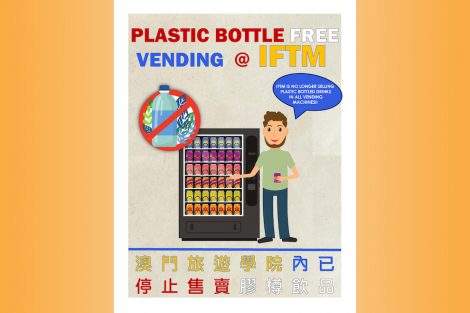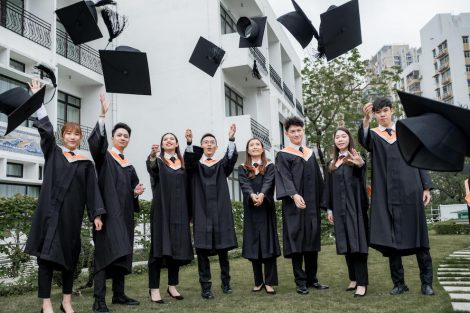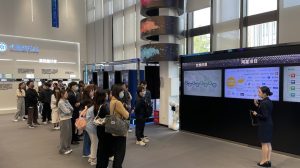IFTM is hosting this September the 10th edition of its annual “Healthy and Green Month”. Events held during the period promote environmental sustainability and healthy living. They are part of the Institute’s commitment to ensuring its operations are outstanding in terms of environmental sustainability, and therefore have a positive impact on the Macao community.
As part of this year’s Healthy and Green Month, IFTM will implement a definitive ban – in all on-campus vending machines – of drinks packaged in plastic bottles. The Institute is the first higher education institution in Macao to move in this direction, aiming to contribute to a reduction of throwaway plastic items. According to international data, almost 1 million plastic bottles are purchased every minute around the world.
Since the launch of the first Healthy and Green Month in 2012, IFTM has strived to become a leading ‘green’ tertiary education institution in all its activities: in teaching and learning, in research, campus operations, and in governance. The Institute takes a holistic approach, seeking to cover all aspects of sustainability across its functions.
During 2020’s IFTM Healthy and Green Month, there was a total of 1,508 instances of participation by individuals. The 2020 edition had 11 activities: fewer than in previous years, due to the impact of the COVID-19 pandemic.
Activities in the 2021 Healthy and Green Month include the programme ‘Have you saved the world today?’. It aims to stimulate participants to adopt environmentally-friendly forms of behaviour as part of their daily routine.
IFTM is also introducing aquaponic systems and rainwater collection systems to its gardens, promoting sustainable water management practices. Aquaponic systems couple aquaculture (i.e., the harvesting of aquatic animals) with hydroponics (i.e., the cultivating of plants in water). In aquaponic systems, the nutrient-rich aquaculture water is reused to feed the hydroponic-grown plants.
During the 2021 Healthy and Green Month, there also will be distribution of home-grown plants to IFTM staff and students, to promote the ‘greening’ of their working and living spaces. The activity will be held on 24 September at the Inspiration Building.
An important part of each Healthy and Green Month is the hosting of activities advocating the saving of energy. That includes the “Mid-Autumn No Air Con Night”, returning for a third year, where participants are invited to turn off their air conditioners for one night, as a community reminder of the benefits of energy conservation. This year, the event takes place on 21 September.
All activities for the 2021 Healthy and Green Month have been devised taking into consideration the need to prevent the spread locally of COVID-19. The programme includes specially-designed activities involving ‘zero contact’ between participants, as a pandemic countermeasure.
Top down, bottom up
The Institute’s Environmental Management System Committee is responsible for making IFTM’s sustainability ambitions a reality. In addition, the body promotes environmental-protection awareness among all staff, students, guests and other Institute stakeholders.
To achieve its environmental goals, IFTM adopts a dual approach, featuring ‘top-down’ strategies and ‘bottom-up’ initiatives. The former include macro projects such as the introduction of large-scale infrastructure like renewable energy systems. The ‘bottom-up’ initiatives cover micro-level actions ranging from replacing single-use toiletries with refillable containers at IFTM’s Educational Hotel Pousada de Mong-Há, to reducing use on campus of disposable food containers and utensils.
IFTM is making meaningful strides toward sustainable operations, under its “6R” approach: “reduce”, “reuse”, “repair”, “recycle”, “rethink” and “refuse”. An example is that since academic year 2020/2021, all those matriculating from IFTM programmes – either at diploma, bachelor’s degree or postgraduate level – wear for their graduation ceremony the same basic form of gown outfit. Only the hood of the gown and the tassel of the mortar board headgear vary, depending on their qualification, meaning gowns can be reused. IFTM was the first higher education institution in Macao to introduce such a ‘green’ system for its graduation gown outfits.
In January, the Educational Restaurant became the first – and so far, only – Macao establishment to be awarded a Michelin Green Star from the publishers of the famed fine-dining guide, for commitment to sustainable gastronomy. Michelin Guide introduced the Green Star category in 2020: the IFTM Educational Restaurant was recognised for its contributions to sustainable gastronomy, including the use of regional produce, the growing of its own herbs at a garden on the Mong-Há Campus, and for its food waste and environmental management systems.
Reduction of food waste has been a priority of IFTM over the years. Such efforts echo President Xi Jinping’s message that China should take immediate action against food waste. Projects in hand at the Institute include adoption of a food-waste management system using artificial intelligence (AI).
There have been clear, tangible outcomes from IFTM’s ‘green’ push. In 2020, the Institute reduced food waste by 63.6 percent in year-on-year terms, while water consumption declined by 12.2 percent. IFTM also achieved a reduction of 8 percent in carbon dioxide emissions caused by electricity consumption. Savings were partially ‘helped’ by the pandemic, as in-person classes were suspended for most of the first half of the year.
IFTM’s Environmental Management System Committee says boosting environmental awareness and the environmental literacy of students is not only good for the community: it can also improve employability of fresh graduates. As the tourism and hospitality industry moves to become increasingly more sustainable and to achieve carbon neutrality, employers are on the hunt for talent that can add value in the implementation of environmentally-friendly management practices.











